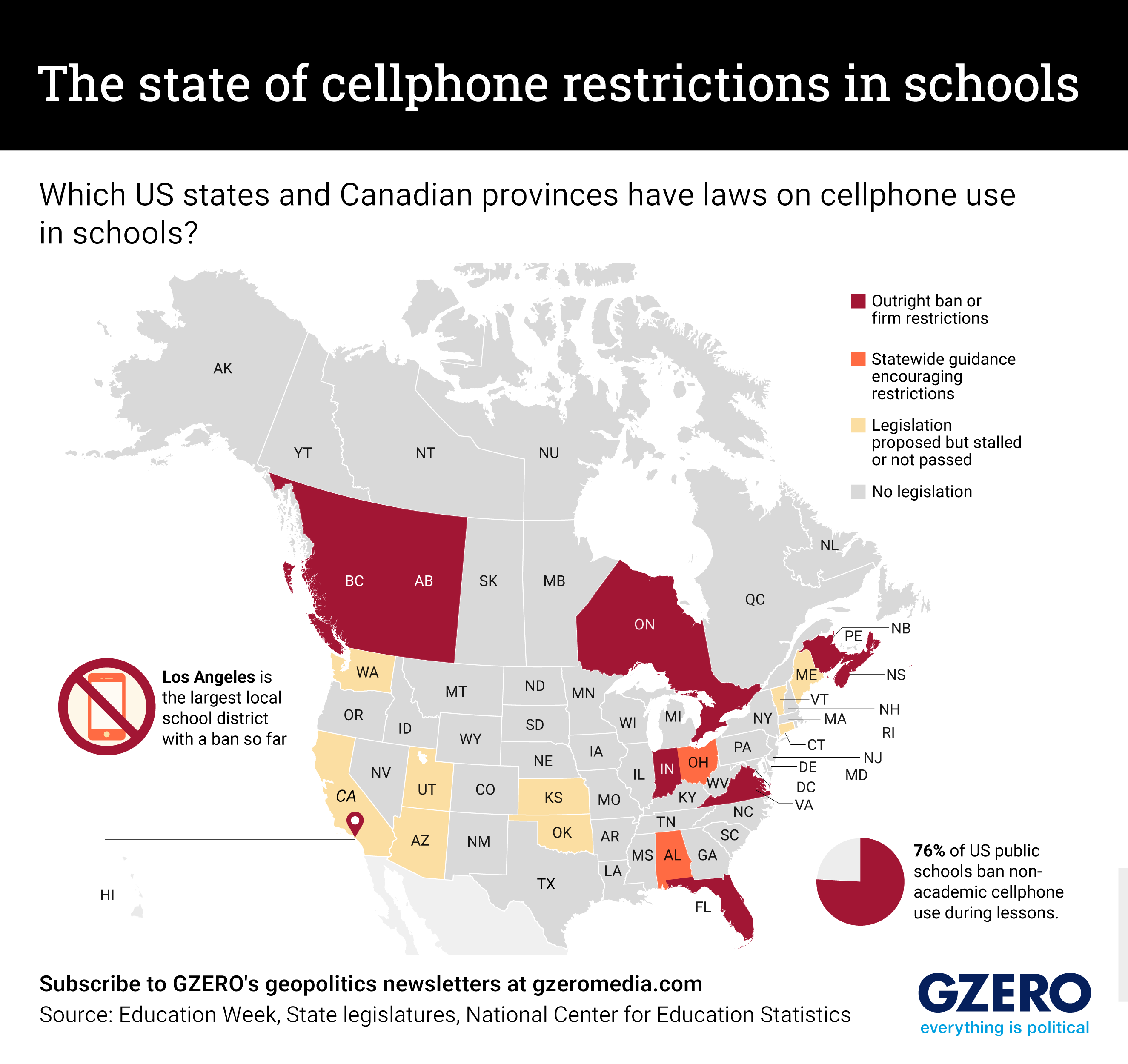July 25, 2024
Should smartphones be banned in schools? Three-quarters of US schools already restrict the use of cellphones during lesson hours, but only a handful of state governments have imposed blanket restrictions. Florida became the first one last year, followed by Illinois and Virginia, where bans will take effect this school year. In Canada, half a dozen provincial governments have passed restrictions.
The measures come amid growing scrutiny of the harmful effects of smartphone use in general – and social media in particular – on teen mental health. US Surgeon General Vivek Murthy in May called for cigarette-style health warnings on social media. A recent bestseller traces the rise of the current “Anxious generation” to the emergence of smartphones in the early 2010s. And as any schoolteacher can tell you, smartphones are generally not great for the classroom learning experience.
But on the other side of it, parents have raised safety concerns. Cellphones are often the only way for caregivers to locate or contact children during emergencies. As the number of US school shootings has soared over the past 10 years, some parents are particularly reluctant to cut that tie – especially during school hours. Alongside these worries, many parents and lawmakers simply think the decision should be left to local school boards rather than faraway state legislators.
Here is a look at the current state of cellphone bans in the US and Canada. By the way, where do you stand on this issue? Let us know here, along with your name and location, and we may publish your response in an upcoming edition of GZERO North.
More For You
World Central Kitchen staff hand out free soup in a neighbourhood that experiences electricity and heating outages following recent Russian attacks on Ukraine’s civilian infrastructure during subzero temperatures in Kyiv, Ukraine February 3, 2026.
REUTERS/Thomas Peter
1,170: The number of high-rise buildings in Kyiv that were left without heating following a barrage of Russian attacks last night on Ukraine’s capital and its energy facilities, per Kyiv Mayor Vitali Klitschko.
Most Popular
What We’re Watching: US critical minerals summit, Rafah crossing reopens, Border violence in Pakistan
Feb 02, 2026
U.S. President Donald Trump and Japanese Prime Minister Sanae Takaichi hold up signed documents regarding securing the supply of critical minerals and rare earths, at a bilateral meeting at Akasaka Palace in Tokyo, Japan, October 28, 2025.
REUTERS/Evelyn Hockstein
Representatives from the European Union, United Kingdom, Japan, and others will meet in Washington this week to discuss a strategic alliance on critical minerals.
Hard numbers: Large protests in Czechia, UAE-linked firm has large stake in the president’s company, & More
Feb 02, 2026
People take part in a rally in support of Czech President Petr Pavel, organised by Million Moments for Democracy group in reaction to dispute between President Pavel and Czech Foreign Minister and Motorists chair Petr Macinka, in Prague, Czech Republic, February 1, 2026.
REUTERS/Eva Korinkova
80,000: The number of people estimated to be in the streets of Czechia on Sunday to show their support for President Petr Pavel after he blocked the nomination of an environmental minister who performed the Nazi salute and posted Nazi memorabilia.
US President Donald Trump and musician Nicki Minaj hold hands onstage at the US Treasury Department's Trump Accounts Summit, in Washington, D.C., USA, on January 28, 2026.
REUTERS/Kevin Lamarque
The US has started handing $1,000 to the bank accounts of newborn babies. But can policies like this one help boost sagging birthrates in advanced democracies?
© 2025 GZERO Media. All Rights Reserved | A Eurasia Group media company.
